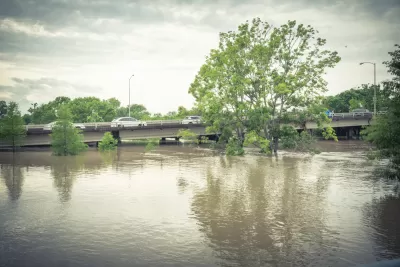The U.S. Army Corps of Engineers has revised a plan to protect the Houston region from flooding by tossing out a proposed tunnel and opting instead to dig Buffalo Bayou wider and deeper.

The U.S. Army Corps of Engineers on October 5 released an interim feasibility report that revised plans to address flooding in Houston, evolving a project launched in the wake of Hurricane Harvey.
Shawn Arraj reported on the news at the time of the interim report's release, noting that the Army Corps had decided against a building a network of underground tunnels leading away from the (Addicks and Barker) reservoirs.
The Army Corps dropped the plans for tunnels because of costs. "Initial cost estimates for the tunnels ranged from $2.2 billion-$12 billion," according to Arraj.
Given the lessons of Harvey and the critical importance of floodwater protections in the face of increasing numbers of extreme weather events, the Army Corps plan is still a frequent topic of discussion in the local news media—and the Houston Chronicle has run two article recently sharing the opinions of local stakeholders critical of the Army Corps' approach to stormwater resilience in the area.
The decision to dig the Buffalo Bayou wider and deeper is the subject of a recent article by Emily Foxhall, who focuses on the criticisms of conservationists who say the new plan reflects old-fashioned thinking at the Army Corps, and call for a nature-focused approach to resilience.
"People puzzled over why the Corps wasn't continuing to look at tunnels, considered less disruptive to communities, or excavating more dirt from the Addicks and Barker reservoirs, maybe building a new park space on top," writes Foxhall.
Another article by Lisa Gray provides an in-depth interview with Jim Blackburn, the co-director of the SSPEED Center at Rice University. When asked for an assessment of the report, Blackburn says it might have been a stroke of genius for riling up so much of the community. "It caused the community to really take this under their wing in a way that they may not have done otherwise," says Blackburn in the interview.
Public feedback on the October interim feasibility report is expected to help the Army Corps decide on a final proposal. The Harris County Flood Control District would need to approve the majority of funding for whatever project comes to fruition. Congressional approval will also be necessary.
FULL STORY: Digging Buffalo Bayou deeper? Houstonians up in arms over Army Corps' 'old-fashioned' flood fixes.

Planetizen Federal Action Tracker
A weekly monitor of how Trump’s orders and actions are impacting planners and planning in America.

Congressman Proposes Bill to Rename DC Metro “Trump Train”
The Make Autorail Great Again Act would withhold federal funding to the system until the Washington Metropolitan Area Transit Authority (WMATA), rebrands as the Washington Metropolitan Authority for Greater Access (WMAGA).

The Simple Legislative Tool Transforming Vacant Downtowns
In California, Michigan and Georgia, an easy win is bringing dollars — and delight — back to city centers.

The States Losing Rural Delivery Rooms at an Alarming Pace
In some states, as few as 9% of rural hospitals still deliver babies. As a result, rising pre-term births, no adequate pre-term care and "harrowing" close calls are a growing reality.

The Small South Asian Republic Going all in on EVs
Thanks to one simple policy change less than five years ago, 65% of new cars in this Himalayan country are now electric.

DC Backpedals on Bike Lane Protection, Swaps Barriers for Paint
Citing aesthetic concerns, the city is removing the concrete barriers and flexposts that once separated Arizona Avenue cyclists from motor vehicles.
Urban Design for Planners 1: Software Tools
This six-course series explores essential urban design concepts using open source software and equips planners with the tools they need to participate fully in the urban design process.
Planning for Universal Design
Learn the tools for implementing Universal Design in planning regulations.
Smith Gee Studio
City of Charlotte
City of Camden Redevelopment Agency
City of Astoria
Transportation Research & Education Center (TREC) at Portland State University
US High Speed Rail Association
City of Camden Redevelopment Agency
Municipality of Princeton (NJ)




























